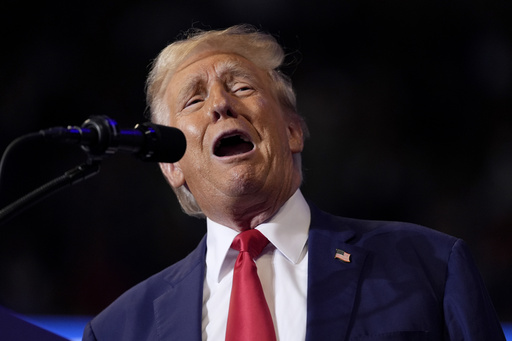
In Bedminster, New Jersey, Donald Trump’s campaign is actively trying to regroup as the Democratic convention begins in Chicago. The focus has sharpened after grappling to adapt to Vice President Kamala Harris’s position as the top pick on the opposite ticket. Trump aims to disrupt the Democratic festivities with a full schedule that involves daily events in battleground states, emphasizing topics where Republicans feel they have an edge. This week marks his busiest campaigning period since the winter, when he faced rivals in the Republican primary.
However, Trump’s events labeled as policy speeches often resemble his typical lengthy rally remarks. Throughout his political career, Trump has a habit of overshadowing his own message by making outbursts and launching attacks that drown out everything else. At times, the former president and Republican nominee appears to be in denial about Harris being his primary opponent instead of President Joe Biden.
Trump has resorted to launching personal attacks, spreading falsehoods about Harris’s crowd sizes, and engaging in racist tropes by casting doubt on her racial background as she vies to become the nation’s first Black female and South Asian president. Such outbursts are causing concern among his allies, who fear that Trump’s behavior is jeopardizing his chances in what they view as an exceedingly winnable race. Both privately and publicly, they have urged him to shift his focus to policy rather than personality and to make efforts to broaden his appeal to swing voters as they become increasingly apprehensive about Harris’s competitive edge.
Despite some urging from allies to concentrate on policy, Trump’s upcoming schedule includes addressing the economy and energy in Pennsylvania, discussing crime and safety in Michigan, and focusing on national security in North Carolina. Later in the week, he plans to visit the southwest border in Arizona to discuss immigration. Despite calls for a more policy-centered approach, Trump’s inclination towards personal attacks has persisted, drawing criticism from critics and some veterans. At a rally in Pennsylvania, he once again veered off from the economy to launch personal attacks against Harris, asserting his superior appearance compared to hers.
Trump’s campaign has faced significant challenges following a turbulent period that has reshaped the campaign landscape. Just a month ago, Republicans were optimistic about their prospects at their national convention, but Biden’s endorsement of Harris quickly altered the dynamics of the race. Polls indicate Harris is performing well in battleground states like Pennsylvania, Michigan, and Wisconsin, hinting at a close contest. Despite the challenges, the former president’s team remains confident in his chances, intending to paint Harris as a liberal extremist and highlight the differences between the candidates on key issues.
In Asheville, North Carolina, attendees like 75-year-old Mary Ray expressed concerns over Trump’s focus on personal attacks. Ray pointed out that such attacks could alienate potential voters and emphasized the need for a shift towards issue-based discussions. The campaign’s effectiveness in striking a balance between policy and personal attacks may play a crucial role as the election draws nearer.
